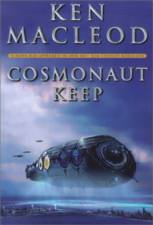






|
Bookshelf:Recently Finished:
 Next up:
|
The Handmaid's TaleTonight I finished reading Margaret Atwood's famous (perhaps infamous) novel The Handmaid's Tale (1985). In a roundabout way it brings a piece of my college life to a close, as my college girlfriend Kathleen was very "into" this book for a while 'way back when, and we went to see the 1990 movie adaptation when it hit the theaters. Narrated in the first person by one of the handmaids, the novel takes place in the near future, in and around Boston, MA (presumably in Cambridge), after a revolution results in a big chunk of the country ruled by the Christian fundamentalist "Republic" of Gilead. Due to declining fertility rates, the powerful Commanders are assigned "handmaids", with whom they have ritualistic sex in hopes of having children. The society is ultra-patriarchal (you know, I used to think "patriarchal" was such a stupid word, but obviously I've given up that notion after hearing it used for over a decade) and all women - even the Wives of the Commanders - are forbidden to read or to hold much real authority at all (save over each other). Prayer is mandatory, and transgressions against the law are punishable by mutilation or death (usually by hanging). Handmaids are given names related to their Commanders, and the narrator is "Offred", who describes what her life is like, full of checkpoints and inspections (of several different kinds), silence and boredom and memories of her husband and daughter before the revolution. Things gradually begin to happen to Offred, and it's clear that everyone in this society is trapped in one fashion or another. She's neither stupid nor weak, but she's had much of her spirit sucked out of her. The book is interesting on a couple of counts. First, it's obviously a heavy-handed cautionary tale against the dangers of religious government. It makes a tasty example of Serena Joy, the Commander's wife who had been in her past life had preached that women should stay home and obey their men, and the price she paid once she got what she wanted. Atwood mostly avoids the big issues about how the revolution happened, but focuses on its day-to-day, personal results. It's not at all hard to see a religious government in the US behaving in a manner similar to this; after all, the fundamentalist Moslims are doing so in Afghanistan today, and Christianity isn't really all that different where it matters. More generally, it's a strong social exploration of a certain kind of slavery. If society only cares about womens' ability to bear children, and doesn't care about whether they can walk, or talk, or read, or work, what would their lives be like? What is an utterly dull life like to an intelligent person? (Of course, The Handmaid's Tale isn't the only book to explore this subject. It does so well, though.) The parallel to the abortion issue is also obvious: Once we as a society deny women the right to choose whether to go through with a pregnancy, haven't we taken the first step on the road to a society such as this one? As a story, the novel is less successful. It has little true conflict, and thus little resolution. Indeed, the last 30 or so pages are essentially about the lack of resolution of Offred's story. She herself is something of a cipher, and her narrative is told dispassionately and even tediously. Although there's some powerful prose here, the tone also makes the book considerably easier to read than I'd anticipated. (One of the reasons I've put off reading it - despite owning a copy for about ten years - is that I've never been in the mood to read as depressing a book as I'd thought it would be. It turned out not to be as hard as I'd expected.) It's a thought-provoking book, but not an especially enjoyable one. A good book to read if you want to discuss it with other people (I actually was going to read it for my book discussion group last weekend, but obviously didn't get to it in time). If you want to read something that you'll enjoy and remember, try something else. (BTW, the movie is essentially similar, although with a couple of key differences, notably the ending. It's less pleasant but a little more rewarding in its plot than the book is.)
 I've been working on Ceej-ifying my journal, which means (as Ceej did with hers) writing Perl scripts to handle some of the automatic tasks like computing the next and previous entries for an entry so I don't have to type them in. I've finished that task and this is the first entry using those scripts. I also plan to automate the day and date generation chores of each entry, as well as the month and year indices and the links to the entries on the main journal page. Or, maybe I'll get sick of doing all this halfway through and never finish. You never know, with me.
|
||